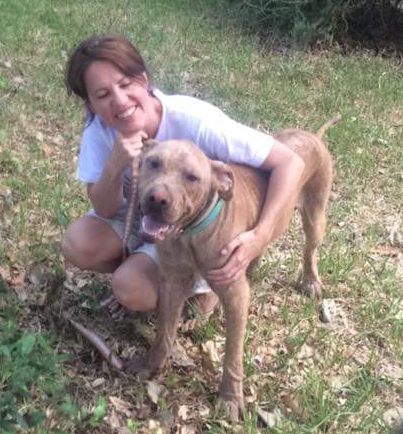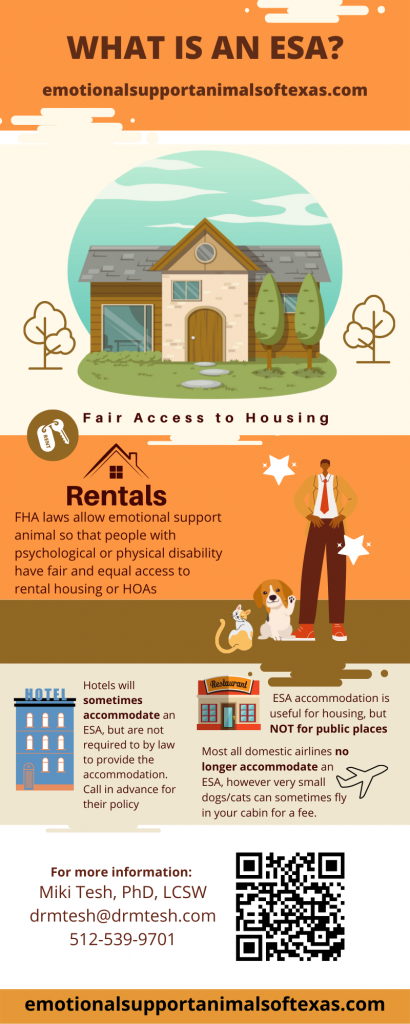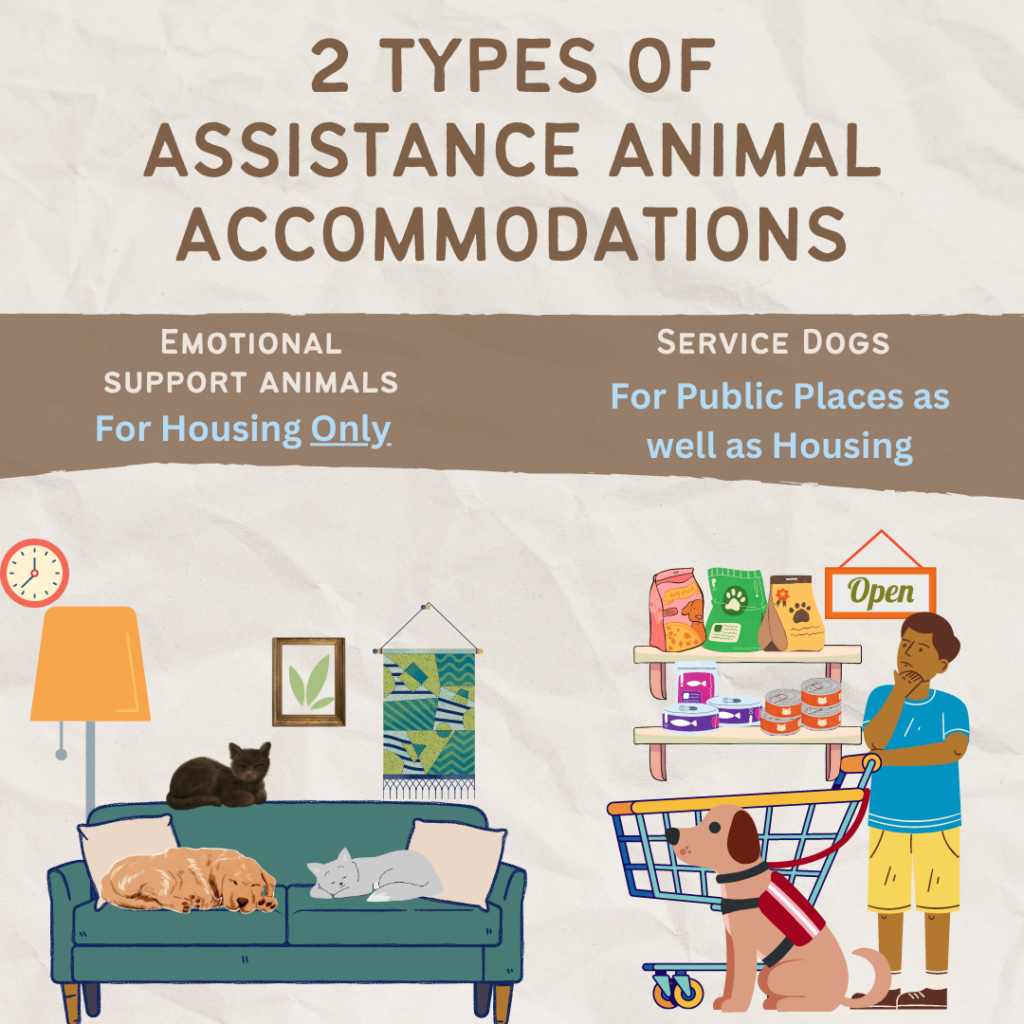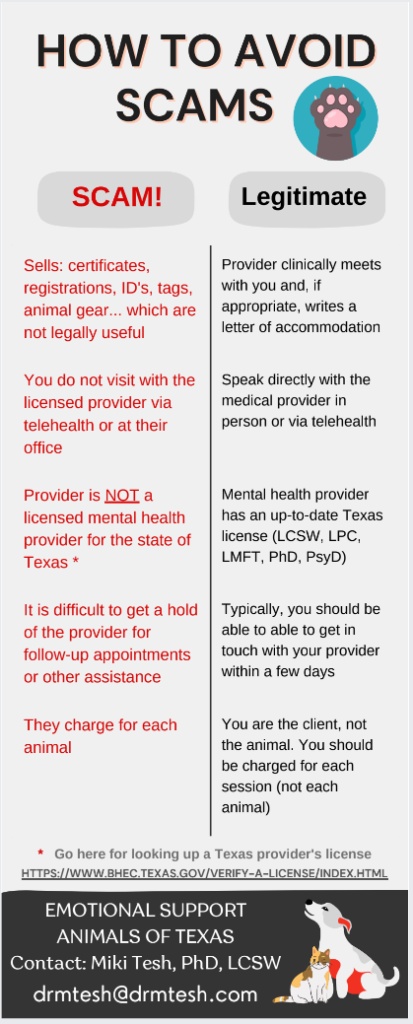I am a Texas State-Licensed Therapist Providing evaluations for you as the patient for need of an ESA and assistance animal in Texas. These accommodations are primarily for housing purposes (e.g. rentals, HOA’s, and hotels). Often accommodations, when deemed necessary, will require an accommodation letter to be provided to housing managers. Before being able to provide an accommodation, you would need an extensive evaluation. It is never guaranteed that someone is an appropriate for an accommodation, but I do my best to gather as much information as possible to form a recommendation.
Typically a support animal accommodation begins with an evaluation, and if deemed medically appropriate, I would be able to write a letter of accommodation. You would then make a request to the landlord, providing the letter – preferably by email so there is a record of doing so. The medical accommodation letter is also typically called an emotional support animal letter, or assistance animal letter.
As a Texas LMHP, Ph.D., and LCSW, I help you through an extensive evaluation to help determine if you are an appropriate fit for needing an emotional support animal accommodation.
(ESA) Emotional Support Animals in Texas
The process I use to determine “a good fit” includes (but is not limited to) an extensive evaluation where you will answer many questions. You will complete a lengthy intake asking about any mental health challenges, and how your animal helps you improve symptoms, and improves your ability to function better in life. You will be asked various other questions to gather a holistic perspective on your needs. I encourage that you provide past medical records showing if and how you have been treated for your mental health. If you do not have a past history of treatment, you may need to meet with me the following week, or as needed, depending on your situation. Having mental health challenges does not automatically mean that an accommodation is an appropriate fit for you. There needs to be a connection (i.e. nexus) between what the animal 1. does for you (which could be companionship), 2. how the animal reduces psychiatric symptoms (e.g. depression, anxiety, etc), and 3. how the reduction of symptoms helps you be able to function better for major responsibilities. Technically, this would be considered a “disability accommodation”. Under the FHA, a disability is a physical or mental impairment that substantially limits one or more major life activities (See 24 C.F.R. § 100.201).
Functional limitations could include (but are not limited to) concentrating and remembering, problem solving for making executive decisions, maintaining stamina for sustaining enough energy to spend a whole day attending to responsibilities, communicating and interacting with others, multitasking and managing tasks for handling deadlines, coping with unexpected changes in schedule with limited ability to tolerate interruptions, severe work performance anxiety reducing ability to complete tasks, learning for attending to projects, etc.
I focus on how your emotional support animals helps your mental health. Sometimes an animal helps with physiological symptoms like diabetes or seizures, however I stay focused on mental health concerns, e.g. depression and anxiety. Your animal needs to be able to help mitigate any functional limitations you may experience when experiencing psychological symptoms and distress. Sometimes your animal might do something very specific (like deep pressure therapy), or they may simply provide companionship.
Sometimes your housing may also want me to complete forms for their own process. While I do so most of time, occasionally I will not answer questions that I do not know the answer to, or if the questions should not be asked in the first place (such as diagnosis or treatment plan).
MAY NOT INSIST ON SPECIFIC TYPES OF EVIDENCE
Please see page 16 at https://www.fairhousingnc.org/wp-content/uploads/2020/01/HUDAsstAnimalNC1-28-2020.pdf
Housing providers may not require a health care professional to use a specific form (including this document), to provide notarized statements, to make statements under penalty of perjury, or to provide an individual’s diagnosis or other detailed information about a person’s physical or mental impairments.49
Please see page 14 at https://www.fairhousingnc.org/wp-content/uploads/2020/01/HUDAsstAnimalNC1-28-2020.pdf
The housing provider may not insist on specific types of evidence if the information which is provided or actually known to the housing provider meets the requirements of this guidance (except as provided above). Disclosure of details about the diagnosis or severity of a disability or medical records or a medical examination cannot be required.”
WHAT IS RECOMMENDED
See page 11 of this HUD link https://www.fairhousingnc.org/wp-content/uploads/2020/01/HUDAsstAnimalNC1-28-2020.pdf “One reliable form of documentation is a note from a person’s health care professional that confirms a person’s disability and/or need for an animal when the provider has personal knowledge of the individual.”
It is important to note that disability accommodations are an interactive process. It’s not typically all completed in one conversation with myself or the housing provider. There is often some back and forth between myself and the patient, that occasionally requires follow-up visits when needed for more information. Sometimes I also have to communicate directly with your housing management to verify that I wrote the letter and everything is accurate. This is to prevent any kind of confusion about whether or not I am recommending the necessary accommodation.
It is rare, but you may encounter a hostile relationship with the housing management when approaching them about an assistance animal accommodation. Sometimes this is due to lack of understanding about how the law works, or a lack of understanding about mental health accommodations. I try my best to help mitigate problems between you and your housing manager, and I give tips on how to communicate with them in as productive way possible. Again, this is rare, as most housing managers are professional and understand how the disability accommodation process works. Often, communicating over email with your housing is more productive (rather than a phone call), because the conversation is on record, which will help with avoiding confusion, as well as elicit cordiality and professionalism. As mentioned before, difficult housing manager are rare, but it is always possible to come across these situations, and there are steps you can take to help your situation.
I work with people via Telehealth in Austin, Houston, Dallas, San Antonio, and the rest of Texas. I help people who seek out an therapist within the state, helping them classify their dogs, cats, and other species as emotional support animals.

Dr. Miki Tesh, PhD, LCSW
My session fee ($78) includes:
- Telehealth intake, interviews, observation with the animal, psychometric measurements, clinical social work services, and a review of past history utilizing behavioral healthcare.
- Help with more than one animal (I do not charge extra for more than one animal). It is essential to convey during the intake and our appointment how each of the animals helps you in unique and different ways that the other animal cannot also provide
- A Texas ESA letter (and rarely Service Dog letter)
- Any extra forms needed for your assistance animal or service animal, assuming the questions on a form are within the guidelines recommended by HUD. Mainly housing wants to verify that I was your provider and am making the recommendation. The housing manager can also email or call me.
- Forms needed during the year (in case you move to a different location).
- Education and advocacy for your assistant animals or service animal
- If for any reason you are not a good fit for us working together, I will be sure to refer you to other resources so you can obtain the mental health services that you need. I will not charge you when I am unable to help my clients and try to give you a heads up in advance.
What is the difference between a Psychiatric Service Dog and an Emotional Support Animal (AKA assistance animal or ESA)?
Service Dogs – It is uncommon for me to provide a psychiatric service dog letter. A PSA is specifically trained, by yourself or a professional, to complete a task, or attend to a need related to a mental health disability. The dog might respond to a command, or sense a need (such as a panic attack), and then perform an action (such as nuzzling, laying on the person, etc.). PSA’s or psychiatric service dogs are allowed to accompany you to most public places, such as stores, planes, gyms, etc. Your rights to have a psychiatric service dog in Texas are federally protected by the ADA (Americans for Disability Act), HUD (Housing and Urban Development), and the FHA (Fair Housing Act). That being said, if you ever do get “pushback,” from a store (for example), it may be because the establishment does have the capacity to accommodate the service animal. In my opinion, it is best to go to a different establishment that is more understanding. The goal is to reduce distress, not aggravate distress.
Emotional Support Animals – Most people want an emotional support animal (not a service dog). An ESA or Assistance Animal does not have to be specially trained, can be any type of animal (cat, bird…), and a person can have more than one emotional support animal. An ESA helps improve a person’s mental health by living with and accompanying them for housing. While a service dog can go to public places, an ESA might not necessarily be allowed into public places (like stores or gyms) unless the owner/manager of the location grants permission. Your rights to have an emotional support animal in Texas are federally and state protected by the ADA (Americans for Disability Act), HUD (Housing and Urban Development), and the FHA (Fair Housing Act).


How is an ESA Letter or Service Dog Letter helpful?
HOUSING
Emotional Support Animal letters are primarily designed to prevent discrimination when bringing an animal home to a rental lease. FHA, HUD, DOJ, and the ADA help guide rental companies and managers on how to comply with the law.
PUBLIC PLACES
Public places are not under the same FHA laws as housing, therefore they do not have to accommodate an emotional support animal. You would have to ask if it’s okay in advance. Service dogs, on the other hand, are typically allowed to accompany you to public places according to ADA.
HOTELS
It is at the discretion of a Hotel on accepting emotional support animals. Some honor the letter, and some will not. It is best to call in advance to check on the policy. Service dogs, however, should be allowed to stay at hotels under ADA rules.
FLYING
Most domestic airlines will allow one very small cat or dog for a fee, however, many domestic airlines do not honor emotional support animal accommodations. There are a few private airlines such as JSX.com that accommodate an ESA. There are some international airlines that also accept emotional support animals. Service dogs, however, should be allowed to accompany you. Always check with the airline in advance.
How do I know if an ESA service is legitimate?
Often my clients will find me after trying to obtain an ESA letter or PSA letter from an online service that sells “ESA tag,” “ESA ID,” “ESA vest,” “ESA certification,” or an “ESA registration.” These types of items and documents are NOT legally useful documents that Texas landlords and apartment complexes are required to honor according to HUD, the ADA, and the FHA. Other problems that can occur when:
- An ESA letter is not written from a currently licensed healthcare provider for the state you are located in at the time of the appointment
- You never actually speak with the licensed healthcare provider such as a doctor or mental health therapist by phone, video, or office visit
- You discover that it is difficult to reach the provider at all for further follow-up. Again this is an interactive process between you, your health care provider, and your housing management.
Often, I stay in contact with my clients and will talk to them multiple times to help facilitate the entire process of evaluation, LCSW clinical services, recommendations, references, advocacy, and facilitation. Landlords are required to honor an accommodation letter from an active Texas licensed mental health provider, practicing in Texas, who is available to reach out to for verification of the accommodation letter.
“There are individuals and organizations that sell service animal certification or registration documents online. These documents do not convey any rights under the ADA and the Department of Justice does not recognize them as proof that the dog is a service animal.”
– The Americans with Disabilities Act (ADA)
How I help:
Fortunately, I am a Texas LMHP (licensed mental health practitioner) who specializes in helping those with mental health concerns concerns with possible mental health disabilities. And sometimes individuals need to obtain fair access to housing with their ESA or Service Dog. I have been assisting clients with their assistance and service animal needs since 2015, and have an understanding of the medical, mental health, disability, and legal process for facilitating my clients’ fair access to housing with a Texas ESA or Service Animal. I receive referrals from universities, other healthcare providers, and members of the community because I help individuals in Texas, and have been practicing as an LMHP LCSW in Texas since 2008. (I have been practicing as a social worker since 1998). Furthermore, I am easy to get a hold of here, and I respond as quickly as possible, usually within 24 hours. I also value equal access for everyone and try to keep my fees affordable so as to be obtainable for most people. For this reason, I do not sell unnecessary items such as registrations, certifications, Service Animal vests, or Assistant Animal IDs, nor do I waste a person’s time and money by providing ESA letters to someone who lives outside of Texas, or who I feel wouldn’t qualify for an ESA/PSA. I also do not charge extra when a client has more than one animal, nor do I charge extra for verification forms that an apartment might require. I also do not charge extra for basic questions a client might have. The cost is a flat $78 session fee, and often one entailed session is all that is needed.
For more information: What is an Emotional Support Animal or Service Animal accommodation? How can I get an ESA Letter or PSA letter in Texas? Affordable Emotional Support Animal Letter (flat session fee of $78) About me MAKE AN APPOINTMENT Psychiatric Service Dog What makes PSA different from an ESA in Texas ESA in Campus housing What to do if your ESA letter is denied Affordable vet care in Texas Locations for Emotional Support Animals of Texas Reviews FAQ
I can help you and your ESA live a happy life together in Texas

You can verify me through Psychology Today or Linkedin



